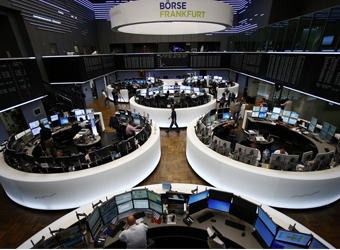Asian Pacific stocks mostly edged higher on Monday, even as China imposed new tariffs on U.S. goods after previously floating the proposal last month.
Japan’s benchmark Nikkei 225 edged higher by 0.41 percent after opening in negative territory and the broader Topix rose 0.2 percent. Retailers and automakers were buoyant, with Fast Retailing tacking on 1.02 percent.
Elsewhere, South Korea’s Kospi index hovered around the flat line, last trading higher by 0.01 percent. Declines in the country’s largest shipmakers were offset by gains elsewhere, including automakers and oil-related plays.
Gains were also seen among so-called THAAD-related stocks, which tend to be sensitive to China-South Korea ties. Shares of Lotte Shopping, Amorepacific and Korean Air Line rose 7.46 percent, 6.47 percent and 1.78 percent, respectively. THAAD-related stocks, named after the anti-missile system, include a range of retail, airline and hospitality stocks.
Mainland markets tracked higher, with the Shanghai composite higher by 0.18 percent and the Shenzhen composite adding 0.62 percent.
Those gains came after China on Friday unveiled its pilot plan to spur high-tech companies listed abroad to also issue depositary receipts on the mainland.
Other indexes in the region also notched slight gains, with Singapore’s Straits Times Index higher by 0.16 percent.
Markets in Australia, Hong Kong and New Zealand were closed on Monday for the Easter holiday.
An ongoing trade spat between the U.S. and China continued to develop, with China announcing early on Monday that it was implementing tariffs on 128 types of U.S. imports starting Monday.
That matched the list of products proposed by Beijing in March and comes as a direct response to U.S. President Donald Trump signing off on tariffs on imported steel and aluminum last month. China said in March that those goods had an import value of $3 billion in 2017.
While the market reaction on Monday appeared calm for the most part, global stocks took a beating last month as markets worried over the possibility of a trade war taking place.
“Trade tensions are unlikely to cool in the near future, but investors should remember that trade actions typically fall far short of initially announced policies,” Hannah Anderson, global market strategist at JP Morgan Asset Management, said in an email.
Anderson added that growth on either side of the Pacific was not expected to be substantially affected in the near term, given the scope and scale of recently announced tariffs.
The cautious move higher in the region also came as the new quarter of the year kicked off.
“Asian bourses are likely to see a slow start to the week as investors ponder how second-quarter trading would pan out,” analysts at OCBC Bank said in a daily note.
On the economic front, Japan’s tankan survey showed large manufacturers were less confident in the three months ending March amid a firmer yen, Reuters said. Big companies, however, also indicated they intended to increase capital spending by 2.3 percent in the new financial year, topping the 0.6 percent projected.
Elsewhere, the Caixin/Markit Purchasing Managers’ Index, which focuses on small and mid-size manufacturing, came in at 51.0 for March, missing the 51.7 forecast in a Reuters poll.
Data released on Saturday showed that manufacturing activity in China expanded more than expected in March.The official Purchasing Managers’ Index rose to 51.5 last month, above the 50.5 estimated in a Reuters survey. That also topped the 50.3 figure seen in February.
In corporate news, Toshiba said in a Friday statement that the planned sale of its memory chip unit would likely be completed in April. It added that the company still intended to close the deal “as soon as possible.” The agreement had been previously slated to be completed by Mar. 31. Toshiba stock slipped 0.65 percent.
Meanwhile, shares of Japan Display fell 5.18 percent. The decline came after the screen maker announced plans to raise funds, which Reuters said would total $518 million.
The dollar index, which tracks the greenback against six rivals, was mostly steady at 89.992 at 12:15 p.m. HK/SIN. Against the yen, the dollar fetched 106.32.
Source: CNBC
